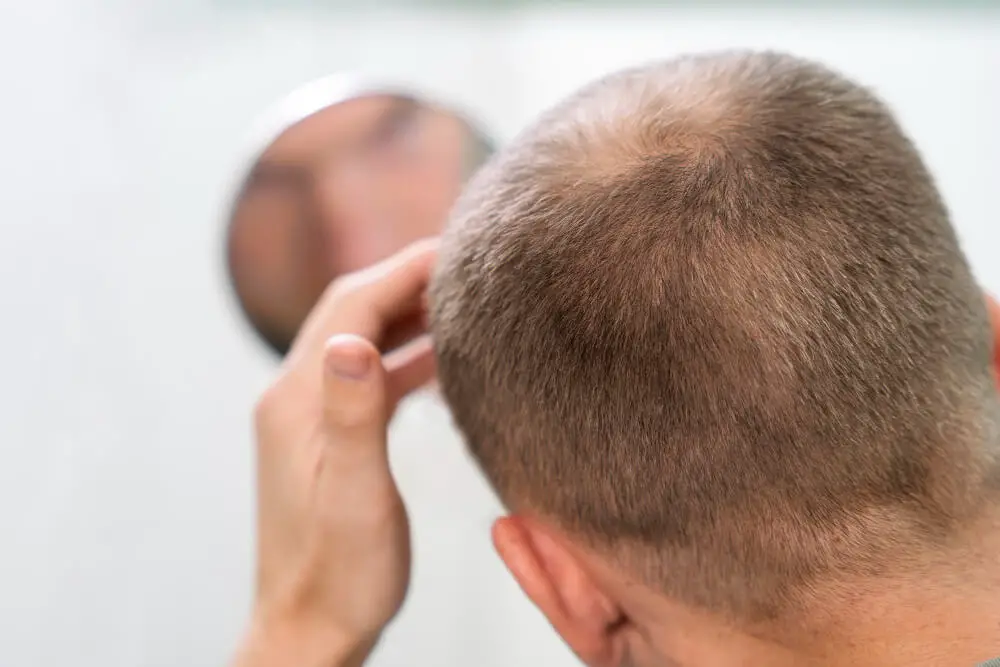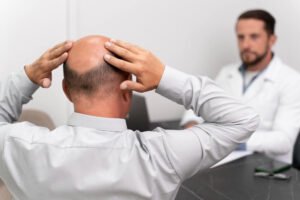Dutasteride for Hair Loss: Unveiling the Solution to Thinning Strands
Hair loss can be a distressing experience, shaking the very foundations of confidence and self-esteem. The mirror reveals a changing landscape, where once-luxuriant locks have receded, leaving questions about what can be done. Enter dutasteride, a contender in the arena of hair loss treatments. This article delves into the intricate world of dutasteride, exploring its mechanism, effectiveness, and the journey to fuller, healthier hair.
Understanding the Culprit: DHT and Hair Loss
The tale of hair loss often begins with a hormone called dihydrotestosterone (DHT). This hormone, a product of testosterone breakdown, wreaks havoc on hair follicles, causing them to shrink and leading to hair thinning. The question arises: can this cascade of effects be halted?
The Rise of Dutasteride: How It Works
Imagine a superhero that battles DHT on the molecular battlefield. Dutasteride, also known as Avodart, steps into this role. It’s a 5-alpha-reductase inhibitor, a scientific term that essentially means it thwarts the conversion of testosterone to DHT. By impeding DHT’s ability to bind to hair follicles, dutasteride aims to preserve and even stimulate hair growth.
The Edge: Dutasteride vs. Other Treatments
In the clash of hair loss treatments, dutasteride stands its ground against its rivals. Comparing dutasteride with finasteride, another DHT-blocker, reveals that the former is the heavyweight champion, inhibiting not only type II but also type I forms of the enzyme responsible for DHT production. The result? A more potent shield against hair loss.
Effectiveness Backed by Science
Scientific studies have ventured into the realm of hair restoration, with dutasteride under the microscope. Clinical trials have showcased its ability to slow down hair loss and even spark regrowth. Dutasteride’s broader inhibition of DHT sets it apart, promising a more comprehensive approach to maintaining hair density.
The Dance of Dosage: How to Use Dutasteride
The script of using dutasteride is written in daily doses of 0.5 mg, typically delivered through oral capsules. However, like any protagonist, it has companions. Combining dutasteride with other therapies, such as minoxidil or hair transplantation, can amplify its effects, creating a symphony of treatments working in harmony.
Safety First: Navigating Potential Side Effects
As with any journey, there are risks along the way. Dutasteride’s side effects, while relatively rare, include changes in libido, erectile dysfunction, and breast tenderness. However, the guidance of a medical specialist can steer you through these potential challenges, ensuring a safe voyage.
The Chronicles of Transformation: Real-Life Stories
Every hero’s journey is unique, and real-life accounts from individuals who have embarked on the dutasteride path offer a glimpse into this transformation. Patient testimonials illuminate the possibilities, highlighting the positive impact dutasteride can have on hair regrowth and, in turn, confidence restoration.
Conquering the Quest: Making Informed Decisions
The finale approaches, and with it, the moment of decision. Weighing the pros and cons, understanding the mechanisms, and consulting a hair loss specialist are pivotal steps. The quest for fuller hair is an individual one, and arming yourself with knowledge empowers you to make the best choice.
As you embark on the journey towards addressing hair loss, the path of dutasteride offers a glimmer of hope. From battling DHT to witnessing real-life transformations, the story of dutasteride unfolds as a potential solution to the challenge of thinning hair. Armed with knowledge, you can make an informed decision and stride confidently toward fuller, healthier hair.
Disclaimer: The information provided in this article is for informational purposes only and should not be considered as medical advice. Always consult with a qualified healthcare professional before making any decisions regarding your health or treatments. For more information, please read our Medical Disclaimer.
Frequently Asked Questions:
- Can women use dutasteride for hair loss treatment?
Dutasteride has shown effectiveness in treating androgenetic alopecia in men, but its use for women is more complex. Due to hormonal differences, women must approach dutasteride cautiously, as it can impact hormone levels. Consulting a healthcare professional who specializes in hair loss can provide personalized guidance based on individual circumstances. - How long does it take to witness results with dutasteride?
The journey to noticeable results with dutasteride varies from person to person. Generally, it takes around three to six months to begin observing the effects, such as slowed hair loss and potential regrowth. However, the full impact may take up to a year or more to become evident. - Are there natural alternatives to dutasteride for hair loss?
While dutasteride offers a pharmaceutical approach to combating hair loss, several natural alternatives are available. These include dietary adjustments rich in hair-friendly nutrients, such as vitamins and minerals, and utilizing topical treatments like minoxidil. It’s important to remember that results from natural alternatives may not be as rapid or potent as those from pharmaceutical treatments. - What should be discussed with a doctor before starting dutasteride?
Before embarking on a dutasteride regimen, open communication with a healthcare professional is crucial. Discuss your medical history, current medications, and any preexisting conditions. Additionally, address concerns about potential side effects and determine if dutasteride is the best course of action for your specific hair loss pattern and needs. - Can I discontinue dutasteride once desired results are achieved?
Discontinuing dutasteride after achieving desired results is a decision best made in consultation with a healthcare provider. Abruptly stopping the treatment may lead to a reversal of the positive effects, with hair loss resuming. Your healthcare professional can guide you on a suitable plan for maintaining results and addressing any potential concerns.
References:
- Gormley GJ, Stoner E, Bruskewitz RC, et al. The effect of finasteride in men with benign prostatic hyperplasia. The New England Journal of Medicine. 1992; 327(17):1185-1191.
- Clark RV, Hermann DJ, Cunningham GR, Wilson TH, Morrill BB, Hobbs S. Marked suppression of dihydrotestosterone in men with benign prostatic hyperplasia by dutasteride, a dual 5alpha-reductase inhibitor. The Journal of Clinical Endocrinology & Metabolism. 2004; 89(5):2179-2184.
- Mella JM, Perret MC, Manzotti M, Catalano HN, Guyatt G. Efficacy and safety of finasteride therapy for androgenetic alopecia: a systematic review. Archives of Dermatology. 2010; 146(10):1141-1150.
- Tosti A, Piraccini BM, Soli M. Evaluation of the effectiveness of finasteride in common baldness (androgenetic alopecia) in clinical practice. European Journal of Dermatology. 2001; 11(6):479-482.




